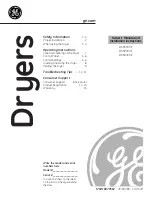
4
IMPORTANT SAFETY INFORMATION.
READ ALL INSTRUCTIONS BEFORE USING.
WARNING!
YOUR LAUNDRY AREA
n
Keep the area underneath and around your
appliances free of combustible materials
(lint, paper, rags, etc .), gasoline, chemicals
and other flammable vapors and liquids .
n
Keep the floor around your appliances clean
and dry to reduce the possibility of slipping .
n
Close supervision is necessary if this appliance
is used by or near children . Do not allow children to
play on, with or inside this or any other appliance .
n
Keep all laundry aids (such as detergents,
bleaches, etc .) out of the reach of children,
preferably in a locked cabinet . Observe all warnings
on container labels to avoid injury .
n
Never climb on or stand on the dryer top .
n
Keep the area around the exhaust opening
and adjacent surrounding areas free from the
accumulation of lint, dust and dirt .
WHEN USING YOUR DRYER
n
Never reach into the dryer while the drum is
moving . Before loading, unloading or adding
clothes, wait until the drum has completely
stopped .
n
Clean the lint filter before each load to prevent lint
accumulation inside the dryer or in the room .
DO NOT OPERATE THE DRYER WITHOUT
THE LINT FILTER IN PLACE.
n
Do not wash or dry articles that have been
cleaned in, washed in, soaked in or spotted
with combustible or explosive substances
(such as wax, oil, paint, gasoline, degreasers,
dry-cleaning solvents, kerosene, etc .) which may
ignite or explode . Do not add these substances
to the wash water . Do not use or place these
substances around your washer or dryer during
operation .
n
Do not place items exposed to cooking oils in your
dryer . Items contaminated with cooking oils may
contribute to a chemical reaction that could cause
a clothes load to catch fire .
n
Any article on which you have used a cleaning
solvent or that contains flammable materials
(such as cleaning cloths, mops, towels used in
beauty salons, restaurants or barber shops,
etc .) must not be placed in or near the dryer
until solvents or flammable materials have been
removed . There are many highly flammable items
used in homes such as acetone, denatured alcohol,
gasoline, kerosene, some household cleaners,
some spot removers, turpentines, waxes, wax
removers and products containing petroleum
distillates .
n
The laundry process can reduce the flame
retardancy of fabrics . To avoid such a result,
carefully follow the garment manufacturer’s
care instructions .
n
Do not dry articles containing rubber, plastic, foam
or similar materials such as padded bras, tennis
shoes, galoshes, bath mats, rugs, bibs, baby pants,
plastic bags, pillows, etc ., that may melt or burn .
Some rubber materials, when heated, can under
certain circumstances produce fire by spontaneous
combustion .
n
Do not store plastic, paper or clothing that may
burn or melt on top of the dryer during operation .
n
Garments labeled Dry Away from Heat or Do Not
Tumble Dry
(such as life jackets containing kapok)
must not be put in your dryer .
n
Do not dry fiberglass articles in your dryer .
Skin irritation could result from the remaining
particles that may be picked up by clothing
during subsequent dryer uses .
n
To minimize the possibility of electric shock, unplug
this appliance from the power supply or disconnect
the dryer at the building’s distribution panel by
removing the fuse or switching off the circuit
breaker before attempting any maintenance or
cleaning (except the removal and cleaning of the
lint filter) .
NOTE:
Pressing
START, STOP
or
POWER
does
NOT
disconnect the appliance from the
power supply .





































